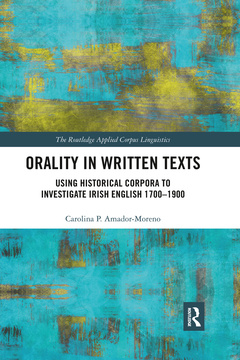Description
Orality in Written Texts
Using Historical Corpora to Investigate Irish English 1700-1900
Routledge Applied Corpus Linguistics Series
Author: Amador-Moreno Carolina
Language: English
Subject for Orality in Written Texts:
Keywords
Late Modern English Period; Young Man; Irish English; Black Vernacular English; corpus linguistics; Black Vernacular; diachronic; USA Data; empirical research; London’s Central Criminal Court; CORIECOR; Emigrant Letters; Correspondence; Great Famine; letters; Irish Emigration; Carolina; Relative Orality; Amador-Moreno; Fitz Patrick; Ireland; Historical Discourse Analysis; pragmatics; sociopragmatic; Sally Moore; corpora; Empathetic Deixis; corpus; Historical Sociolinguistics; multidimensional; Galician Emigrants; Applied Corpus Linguistics series; Historical Pragmatics; Ronald Carter; Historical Linguistic Analysis; Mike McCarthy; Matrix Verb; National Library; Deictic Forms; Heaney’s Translation; Irish Speakers; ROI
50.12 €
In Print (Delivery period: 14 days).
Add to cartPublication date: 06-2022
Support: Print on demand
Publication date: 07-2019
· 15.6x23.4 cm · Hardback
Description
/li>Contents
/li>Readership
/li>Biography
/li>
Shortlisted for the 2020 ESSE Book Award in English Language and Linguistics
Orality in Written Texts provides a methodologically and theoretically innovative study of change in Irish English in the period 1700-1900. Focusing in on a time during which Ireland became overwhelmingly English-speaking, the book traces the use of various linguistic features of Irish English in different historical contexts and over time. This book:
- draws on data from the Corpus of Irish English Correspondence (CORIECOR), which is composed of personal letters to and from Irish emigrants from the start of the eighteenth century up until the end of the twentieth century;
- analyses linguistic features that have hitherto remained neglected in the literature on Irish English, including discourse-pragmatic markers, and deictic and pronominal forms;
- discusses how the survival of the pragmatic mode has resulted in the preservation of certain facets of the Irish English variety as known today;
- explores sociolinguistic issues from a historical perspective.
With direct relevance to corpus-based literary studies as well as the exploration of hybrid, modern-day text forms, Orality in Written Texts is key reading for advanced students and researchers of corpus linguistics, varieties of English, language change and historical linguistics, as well as anyone interested in learning more about Irish history and migration.
List of Figures
List of Tables
Author’s Acknowledgements
List of abbreviations
Chapter 1. Introduction: opening windows into the past
Chapter 2. The historical context of the letters
Chapter 3. The orality of private correspondence. Using emigrant letters for linguistic analysis.
Chapter 4. Discourse-pragmatic variation
Chapter 5. Deictics
Chapter 6. Embedded questions
Chapter 7. Concluding remarks
Index
Carolina P. Amador-Moreno is Senior Lecturer in the Department of English and Director of the Research Institute for Linguistics and Applied Languages (LINGLAP) at the University of Extremadura, Spain.




